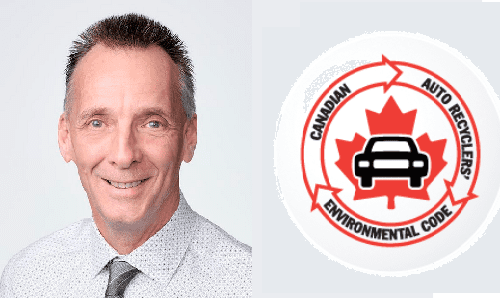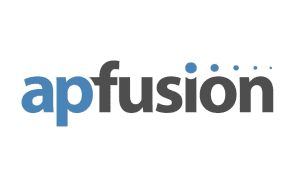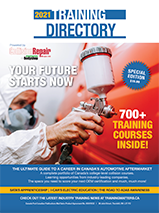Canada’s automotive recycling industry stands at a pivotal crossroads, caught between traditional perceptions and a fast-approaching future defined by sustainability, innovation and cross-industry collaboration.
In this thought-provoking commentary, Wally Dingman, executive director of the Automotive Recyclers of Canada, examines the evolving role of vehicle recyclers amid growing pressure to reduce carbon footprints, cut repair costs and extend vehicle lifecycles.
Drawing inspiration from international best practices and reflecting on Canada’s current challenges, Dingman issues a clear call to action: it’s time to modernize standards and solidify recyclers’ place at the heart of a circular automotive economy.
Toronto, Ontario — Canada’s automotive recycling sector finds itself at a defining moment. As environmental regulations tighten and the economic and ecological costs of manufacturing new parts continue to rise, the value of high-quality reclaimed parts is increasing rapidly. The message is clear: vehicle recycling is no longer just about end-of-life, it’s about extending life.
At a recent UK conference, Adam Murray of Solus (part of Aviva) outlined a vision for reclaiming integration in vehicle repairs that resonates deeply with the Canadian experience. While their challenges of traceability, part compatibility, and insurer hesitancy mirror our own, the path forward offers a powerful call to action for recyclers across Canada.
Where Canada Stands Now
Despite the environmental and economic benefits of reclaimed parts, adoption rates remain modest. In Canada, the majority of insurance repairs still default to using new OEM parts, even when quality reclaimed alternatives exist. A major barrier continues to be confidence, both in the parts and the processes that bring them to market.
Our members, professional automotive recyclers certified under ARC’s CAREC Environmental Audit Program, already meet rigorous standards in environmental stewardship and operational best practices. But traceability, consistent grading, and integration with the collision repair industry remain work-in-progress areas.
It’s a question I’ve asked myself more than once: Are insurers avoiding recycled parts because of process complexity, or are they more concerned about liability if the repair doesn’t go as planned? But rather than focusing on hesitation, we should be asking: “How do we make reclaimed parts the more profitable, efficient option for everyone involved?”
Profitability for repairers is often an unspoken factor; they make more money fitting new parts, even though that costs insurers more. Getting the financial incentives right across the board is just as important as refining the processes.
Standards — and Incentives — Must Evolve
Just as the UK’s VRA Standard is undergoing review, Canada must refine and modernize its own quality frameworks and financial incentives. This means:
Developing national grading systems aligned with modern vehicle technologies.
Ensuring inventory integration with collision estimating platforms.
Reworking financial structures so insurers can support the added labour or prep involved in using reclaimed parts, without expecting recyclers to absorb the burden.
We’re not asking recyclers to do more for free. The prep work required to make a part ’ready-to-install’ has value. If insurers want faster turnaround and broader adoption, they must help pay for the efficiencies they expect.
The need for reform is not just operational, it’s strategic. As insurers like Aviva in the UK commit to sustainability-led procurement, Canadian providers should prepare for similar mandates here. Government targets on emissions, combined with growing corporate ESG pressures, are quickly reshaping the value proposition of green parts.
The Opportunity Ahead
One of the more ambitious discussions emerging from the UK involved reclaiming not just cosmetic or structural parts, but a wider range of functional components. In Europe, OEMs such as Stellantis are already establishing large-scale remanufacturing hubs. If OEMs reclaim that territory without input from recyclers, we risk being cut out of the circular economy we helped build.
Here in Canada, our recyclers supply quality recycled OEM parts, not rebuilt components. These are original parts from end-of-life vehicles, carefully dismantled, tested, and inventoried. With the right standards and collaboration, we can continue to expand our role in providing affordable, sustainable parts that meet the highest expectations.
Time to Collaborate
Canadian recyclers cannot do this alone. Collaboration with insurers, collision centres, and OEM stakeholders is essential. That’s why the Automotive Recyclers of Canada (ARC) is advocating for:
– Cross-sector education on the carbon benefits of reclaimed parts
– Transparent standards that insurers and repairers can rely on
– Input into OEM-led circular initiatives to protect and grow independent recycler involvement
– Insurers to revise their incentive structures to create a level playing field for used parts when competing with OEM components.
– Cooperation/Input with Data consolidators & aggregators
Moving Together, Not Falling Behind
Canada’s auto recyclers have undergone significant transformations over the past decade. Many yards are now high-tech operations with dismantling procedures, fluid recovery systems, and digital inventory that rival OEM distribution. But we can’t stop here.
The next phase demands bold thinking. Reclaimed parts are not only cost-effective, but also climate-critical. If we don’t lead, someone else will. Let’s be at the table as this industry evolves, not reacting to change, but shaping it.


























